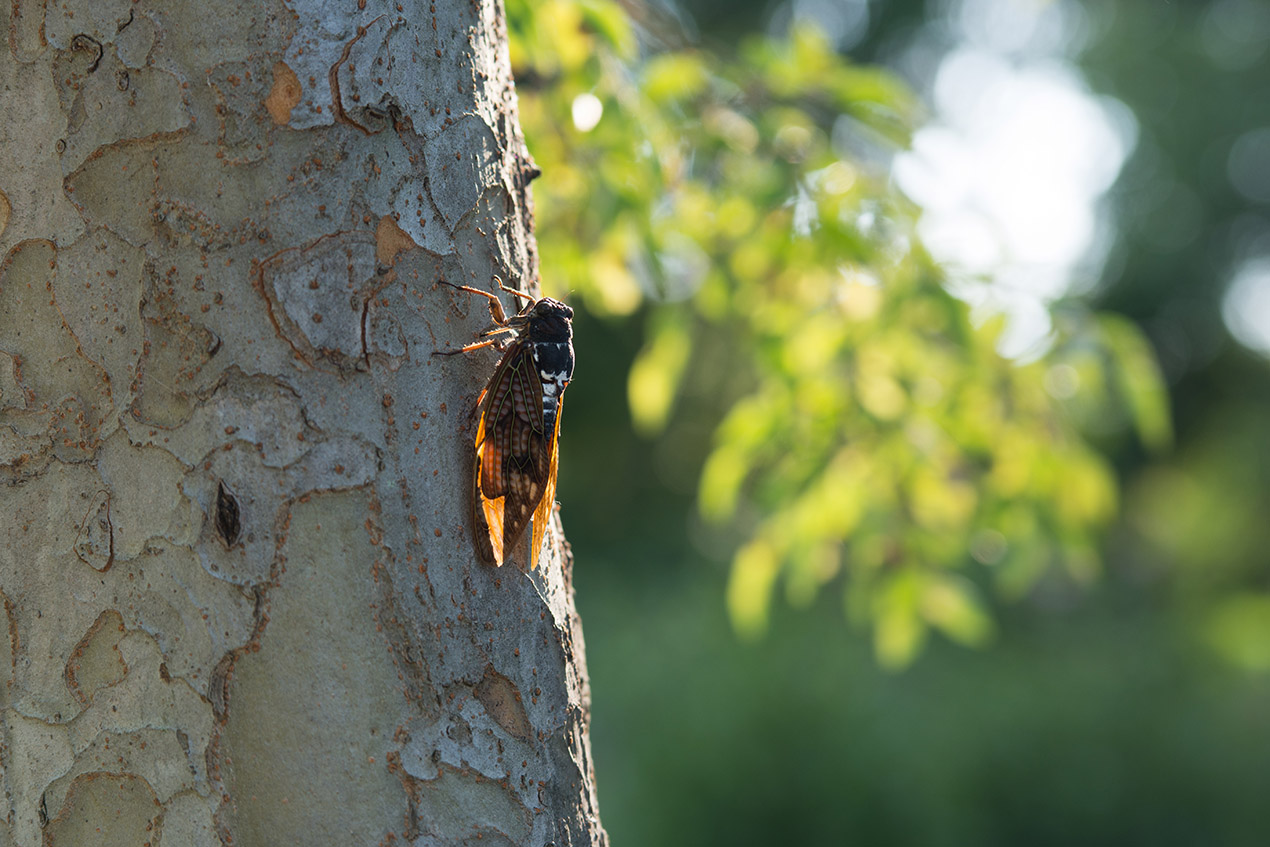May 2024
A Nuisance That Can Be ‘The Stuff Of Nightmares’: CRE Braces For The Swarming Of Cicadas

As published in BISNOW May 23, 2023
By Sonya Swink
Cicadas are all the buzz this spring.
From the hum swarms are create outdoors and an “Orkinstra” celebration planned by pest control company Orkin to harmonize with their “singing” to insect-infused Malört cocktails bringing happy hour buzzes of a different kind, the elusive bugs that emerge just once in a blue moon are everywhere.
And commercial property is not exempt from the onslaught. Two different broods representing trillions of cicadas have already begun emerging across parts of the Midwest and South. While their rare appearance has meant cause for celebration for some, landlords and property owners are girding for battle against an army of pests that have been known to wreak destruction.
The last time the Northern Illinois Brood’s 17-year cicadas and the Great Southern Brood’s 13-year cicadas descended on the U.S., Thomas Jefferson was the nation’s leader. Since then, smaller swarms have emerged and those who lived through them are getting prepared and taking lessons from the past.
“Everything I’ve got is water-cooled, so, I’m very dependent on the water flow for this system, and the little critters just completely stopped the water flow,” Bob Casey, chief engineer at Chicago-based property management firm Hiffman National said, recalling a cicada infestation in 2007 that stopped the HVAC system at a large residential tower in Illinois.
“Yeah, it was the stuff of nightmares,” Casey said.
A once-every-17-year brood emerged that year, with enough cicadas ending up in a ground-floor pump system to knock out the air conditioning at Oakbrook Terrace Tower, the state’s tallest building outside of Chicago. Teams had to immediately start scraping bugs out of pumps that day.
“We all knew that they were coming,” Casey said. “I just didn’t realize the magnitude that it was going to create for us.”
This time, cicadas are swarming in packs large enough to completely cover three states. Such sizable swarms pose an issue to almost any building’s HVAC system, said Janet Ruiz, strategic communications director for the Insurance Information Institute.
“Cicadas can block airflow by landing on condenser coils and swarm fan motors and compressors,” Ruiz said.
The damage can be costly, too, and those costs fall to property managers or the building’s ownership alone since insurance doesn’t typically cover infestations, Ruiz noted. Unless damage qualifies as a covered “act of God,” commercial owners are on the hook for any repairs, she said.
At Oakbrook Terrace, the Hiffman team spent a month’s worth of hours cleaning up from its cicada crisis years ago. This time around, the firm added removable metal screens attached to the building’s chiller system.
The cost of the screening was about $10K. However, if cicadas completely destroy an unprepared HVAC or other system, a worst-case scenario, it could add up to hundreds of thousands of dollars in various damages, Hiffman National Head of Management Services Carrie Szarzynski said.
“You are talking about some repair costs that might be unanticipated and unbudgeted because you didn’t foresee that this could be something that could happen, which is exactly what happened to one of our teams 17 years ago,” Szarzynski said.
Not every property manager is taking extensive precautions. Shari Vass, senior vice president and a longtime property manager for Braeside Group in Illinois, said cicadas are not a concern for her team, other than letting tenants know that the bugs will not actually bite.
“It’s the people, not the buildings” that have to be managed, she said.
Vass’ advice is to change filters at each building’s air conditioning unit and send an email to tenants about cicadas being a generational arrival, not an apocalypse.
But III’s Ruiz said building owners and property managers should at least be prepared to try to keep as many cicadas away from structures as possible. Educational, medical and government campuses prone to using bright lighting, which attracts the bugs, should turn them darker if possible, she said.
Building owners or landlords should check commercial buildings for any holes cicadas could squeeze through, she said. Properties also should inform tenants to keep windows and doors shut this summer, even when it’s hot, to block the bugs and their sounds.
Since male cicadas sing to find mates, their unison is often the most common issue at commercial buildings, said Jim Fredericks, chief entomologist for the National Pest Management Association.
“This loud singing is equated to the volume of a lawnmower or chainsaw,” Fredericks said.
Cicadas en masse can cause other issues. The low-flying insects damage young plant life and shed shells in shorter buildings’ gutters, forcing owners to enlist the services of vendors.
Hiffman’s properties have two-year contracts with landscape partners to handle such issues, but Casey is already hearing about crews inflating prices to clean up cicada carcasses left on sidewalks and elsewhere.
Properties with young trees should also get nets to cover them completely all cicada season, NPMA’s Fredericks said. That’s because female cicadas cut small slits into the ends of young twigs to insert their eggs, causing damage that includes patches of dead leaves on those branches.
One female can lay 500 eggs at a time, and those eggs eventually become cicadas that emerge in their teen years to repeat the cycle all over again.
Despite their nuisance potential, the insects are a feast for birds and other animals and can aerate lawns as part of a natural ecological process, III and NPMA both noted.
And when all else fails, CRE players should remember that this too shall pass — by sometime in July at the latest.
“There’s not much else you can do. This is what we do in real estate,” said Szarzynski. “Our worlds change all the time.”
Read the full story in BISNOW.
About Hiffman National:
Hiffman National is one of the US’s largest independent commercial real estate property management and advisory firms, providing institutional and private clients exceptional customized solutions for property management, facility management, advisory services, accounting, lease administration, lender services, project management, marketing, and research. The firm’s comprehensive property management platform and attentive approach to service contribute to successful life-long relationships and client satisfaction. As a nationally recognized Top Workplace, and perennial CRE award winner, Hiffman National is headquartered in suburban Chicago, with more than 250 employees nationally and an additional six hub locations and 25 satellite offices across North America.
About NAI Hiffman:
NAI Hiffman is one of the largest independent commercial real estate services firms in the US, with a primary focus on metropolitan Chicago, and part of the NAI Global network. We provide institutional and private leasing, property management, tenant representation, capital markets, project services, research, and marketing services for owners and occupiers of commercial real estate. To meet our clients’ growing needs outside of our exclusive NAI Hiffman territory, we launched Hiffman National, our dedicated property solutions division, which provides property management, project services, and property accounting services across the country. NAI Hiffman | Hiffman National is and award winning company headquartered in suburban Chicago, with more than 250 employees strategically located throughout North America.


